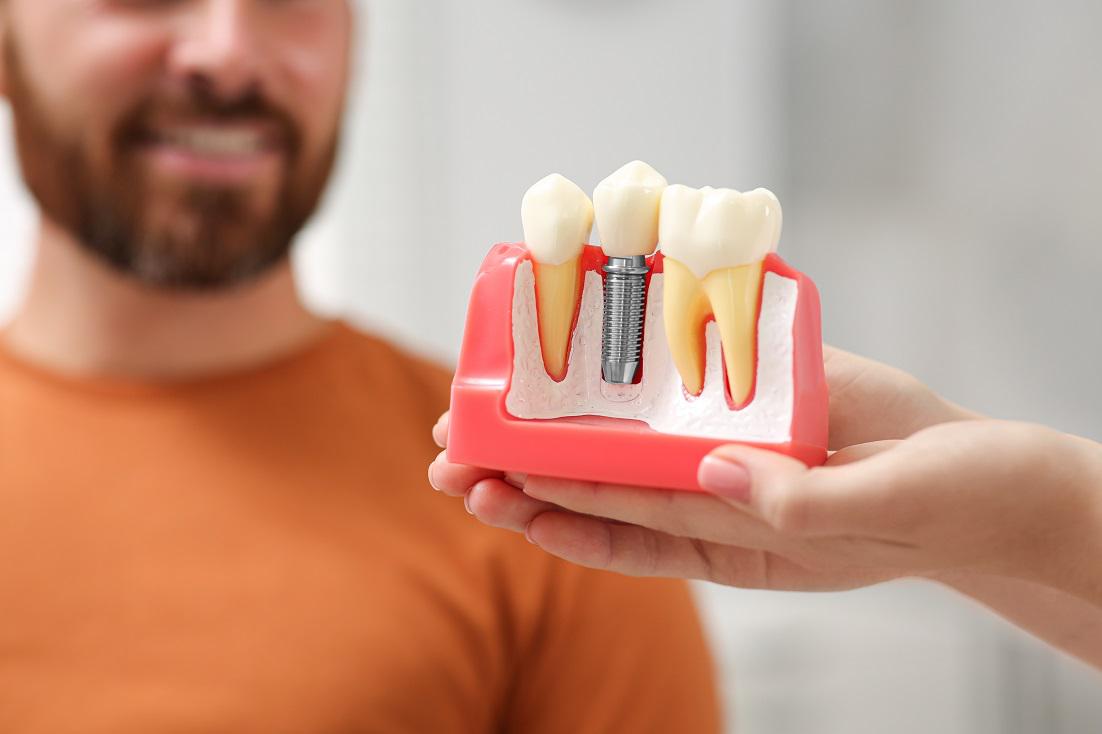Since the invention of dental implants, the dental field has never been the same. This incredible tooth-replacement option offers a permanent solution for individuals with missing teeth. Unlike traditional dentures or bridges, dental implants provide a sturdy and natural-looking replacement. But have you ever wondered how these implants stay securely in place?
If you’re missing one, three, or even all of your teeth, dental implants could be the solution for you! Contact our experienced and trusted dental team today to schedule your initial consultation.
In this blog, we'll dive into the science behind dental implants and explore the factors that contribute to their stability.
The Anatomy of a Dental Implant
Before delving into how dental implants stay in place, let's explain their anatomy. A dental implant consists of three main components:
- Implant Fixture: This is the "root" of the implant, typically made of titanium. It is surgically placed into the jawbone, providing a stable foundation for the replacement tooth.
- Abutment: This connects the implant fixture to the prosthetic tooth. It serves as a connector, securely attaching the replacement tooth to the implant fixture.
- Prosthetic Tooth: Also known as the crown, this is the visible part of the implant. It is custom-made to match the shape and color of your natural teeth, ensuring a seamless blend with your smile.
Osseointegration: The Key to Stability
The primary reason dental implants stay in place is a process called osseointegration, defined as “the direct structural and functional connection between living bone and the surface of a load-bearing artificial implant.” In simpler terms, it's the phenomenon where the jawbone fuses with the implant fixture.
The Process of Osseointegration
- Surgical Placement: During the initial procedure, the implant fixture is carefully positioned into the jawbone. This is done with precision to ensure optimal contact between the implant and the bone.
- Healing Period: After the fixture is placed, a healing period follows. This allows the bone to grow and fuse with the implant. It typically takes several months for osseointegration to occur, but this time frame can vary based on factors like individual healing capacity and the location of the implant.
- Stabilization and Integration: As the bone grows around the implant, it effectively locks the fixture in place. This integration creates a strong and durable foundation for the prosthetic tooth.
- Load-Bearing Capacity: Once osseointegration is complete, the implant can bear the load of everyday activities like chewing and speaking, just like a natural tooth.
Quality of Bone: A Critical Factor
The success of osseointegration and, consequently, the stability of dental implants, is heavily influenced by the quality and quantity of the patient's bone. A sufficient amount of healthy bone is essential for the implant to anchor securely. In cases where bone density is inadequate, additional procedures like bone grafts may be necessary to augment the bone volume.
Precision in Placement
The expertise of the dental provider plays a crucial role in ensuring the stability of dental implants. Precise placement of the implant fixture is essential for successful osseointegration. Factors such as angle, depth, and position are meticulously calculated to optimize contact with the surrounding bone.
Maintenance and Care
While dental implants are known for their durability, proper care is essential to maintain their longevity. This includes regular dental check-ups, diligent oral hygiene practices, and avoiding habits that could exert excessive pressure on the implants.
Schedule Your Initial Consultation
Dental implants derive their stability from the remarkable process of osseointegration, where the implant fuses with the jawbone. This natural integration forms a robust foundation for the prosthetic tooth. Additionally, factors like bone quality, surgical precision, and post-operative care contribute significantly to the long-term success of dental implants.
If you are considering dental implants, it is paramount that you consult with our dental team.
When you visit our office, we will evaluate your individual circumstances and determine if you are a suitable candidate for this transformative dental solution. Remember, investing in your oral health not only enhances your smile but also contributes to your overall well-being. Contact us today!


